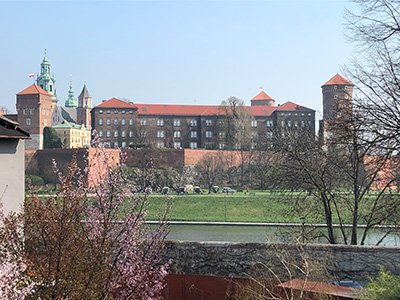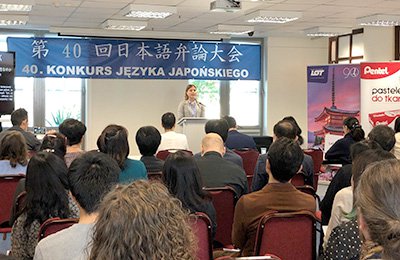2019 Japanese-Language Assistants’ Report: Working with Students Who Are Improving Their Own Levels
Manggha Museum of Japanese Art and Technology
UEDA Yuka
The Manggha Museum of Japanese Art and Technology, where I have been sent, is located in the town of Krakow, Poland. Although Poland is far from Japan, it is actually known as a pro-Japanese country and boasts the largest number of Japanese language learners in Eastern Europe. I will now introduce to you the work of a Japanese-Language Assistant (hereafter referred to as "Assistant") in Poland.

Wawel Castle taken from the classroom
Manggha Japanese Language School
The main duty of an Assistant is to be involved in the day-to-day teaching at the school. A unique feature of the Manggha Japanese Language School is the team-teaching between Polish and Japanese teachers, with the Polish teacher introducing vocabulary and grammar, and the Japanese teacher in charge of practice and activities. The students range from secondary school students to working adults, and they study Japanese hard after school or work on weekdays, or on Saturdays. Currently (Spring 2019 semester), we are offering 13 classes, from beginner to advanced. I am involved in a variety of classes, including beginner, intermediate, and advanced, and to my surprise, in the advanced class, we are studying classical Japanese at the request of the students. I am very happy that there are students who are so interested in Japan that they continue to study Japanese, even to the point of studying classical Japanese.
In addition to teaching, Assistants are also responsible for course design, managing class reports, creating bulletins, and giving placement tests. It has been a very valuable experience for me to be involved in the whole school, holding general meetings in close contact with the coordinators.
Activities Outside the Manggha Japanese Language School
I also participate in and help with events related to Japanese language education in Poland. Here is a brief introduction to some of them. I assist the examiners in the JLPT (Japanese Language Proficiency Test), which is held twice a year. Looking at the test takers gathered at the venue, I realized that many people are really serious about studying Japanese. The first event I participated in after being posted here was the JAPAN BOWL. The JAPAN BOWL is a quiz competition for high school students, where they compete with their extensive knowledge of Japan and their Japanese language skills. One group from the Manggha Japanese Language School participated in the competition, and they cleared difficult questions one after another to win the competition. Another major event is the annual International Speech Contest in Japanese. There is a university/general section and a high school section, and the Assistant is assigned to be the questioner for the university/general section. The content of the speeches and the way the speakers delivered them with such dignity made me realize once again the high level of Japanese language learners in Poland. The winner of the high school division was a student of the Manggha Japanese Language School, which was a first for the school. Of course, the victory was due to her efforts, but I felt pride in the potential of the school. I would like to do my best to provide assistance so that more and more students will be active outside the classroom in the future.

The 40th International Speech Contest in Japanese
I will be the last of the Assistants to be posted to Poland. I am going to think about what I should do as the last assistant, and act accordingly. I still have more than a year left in my term, so I will do my best to experience and learn various things, and then give back to Japanese language education in Poland.
- What We Do Top
- Arts and Cultural Exchange [Culture]
- Japanese-Language Education Overseas [Language]
- Japanese-Language Education Overseas [Language] Top
- Learn Japanese-language
- Teach Japanese-language
- Take Japanese-Language Test
- Know about Japanese-language education abroad
- The Japanese-Language Institute, Urawa
- The Japanese-Language Institute, Kansai
- Japanese-Language Programs for Foreign Specified Skilled Worker Candidates
- Japanese Language Education for Japanese Children Resident Overseas and for the Descendants of Migrants
- Archives
- Japanese Studies and Global Partnerships [Dialogue]
- JF digital collection
- Other Programs / Programs to Commemorate Exchange Year
- Awards and Prizes
- Publications
